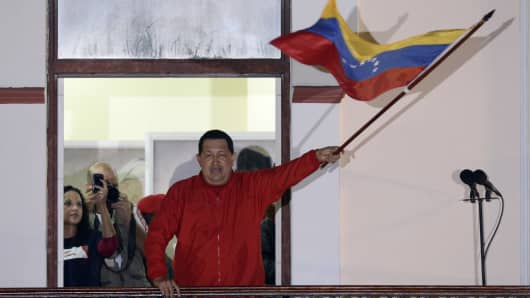Speculation that Venezuelan President Hugo Chavez is no longer fit to govern the oil-rich country has pushed Venezuelan bond prices to record highs as investors bet that Chavez' reign is about to come to an end.
He is due to be sworn into office on Thursday after winning the country's presidential elections in October, beating opposition candidate Henrique Capriles. But most signs indicate that Chavez won't attend his inauguration. The leader suffered a severe respiratory infection following his fourth cancer surgery in Cuba.
"The market is seeing the possibility of a regime change in Venezuela," said Alejandro Arreaza, a New York-based analyst at Barclays. "A government without Chavez opens the door for a devaluation of the currency, some spending cuts and a reduction of nationalizations and expropriations."
Far from spooking investors, Chavez's absence, which could lead to a full-blown institutional crisis if his mandate isn't formally renewed later this week, drove Venezuela's benchmark bond due in 2022 to a record high last week. Venezuelan bonds maturing in 2027 and 2028 jumped to a four-year high. Bonds maturing in 2027 closed at $104.625 on Monday and those maturing in 2028 closed at $102.500.
"It's likely that we won't see further increases in the short term unless we see a clarification on how the transition would go if Chavez is unable to remain in the presidency", he added. Arreaza recommends buying Venezuelan bonds maturing in 2026 and 2031.
(Read more: Venezuela Sees Inflation at 19.9 Percent, Below Target)
Chavez has not been seen in public since undergoing an operation for an undisclosed type of cancer in the Cuban capital of Havana on December 11. Before his operation, he appointed former bus driver Nicolas Maduro, currently serving as vice president and foreign minister of Venezuela, as his successor in an attempt to keep the many factions of the Chavismo movement in check.
So far Chavez supporters have urged for unity and ignored the opposition's call for new elections within 30 days if Chavez becomes permanently absent from office as stated in the Venezuelan constitution. Instead, supporters claim that the inauguration could be postponed until the socialist leader recovers.
"Despite the uncertainty, Venezuela is the best risk-reward option. It offers a good yield, it's oil rich and unlike other Latin American countries, it's never defaulted on its debt," said Francisco Ghersi, managing director at Knossos Asset Management in Caracas.
Early elections wouldn't guarantee a victory for the opposition party either. Chavismo scored a landslide victory in the recent regional elections winning 20 out of 23 governorships in Venezuela. If Chavez were to die, Diosdado Cabello, president of the national assembly and one of his closest allies, would become president until new elections are held and a potential political rival to Maduro.
With a mix of socialist policies and populism, Chavez has polarized Venezuelan politics and the country's foreign policy. Loved and hated in equal measure both at home and abroad, Chavez has nationalized vast swaths of Venezuela's economy, including the country's large oil and gold industry, banks, electrical companies and farms.
"Chavismo without Chavez won't be as radical or as popular. Maduro is not Chavez. He'll have to be more open and conciliatory," he added.
Chavez, known as El Comandante, became a prominent figure in Venezuelan politics after leading a failed coup d'tat in 1992, for which he was imprisoned and subsequently pardoned in 1994. He rose to power in 1999 vowing to improve the lives of millions of Venezuelans living in poverty. Under Chavez, poverty and unemployment have declined but violence and inflation has risen to record levels.
Venezuela is Latin America's biggest oil exporter and the fourth largest supplier of petroleum products to the United States. It holds the world's largest oil reserves according to BP's 2012 Annual Statistical Review of World Energy.
-By CNBC's Maria Tadeo


